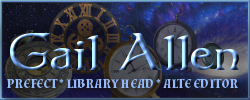New words are invented all the time and some even begin to make their way into popular usage.
Muggle is one of the words from our very own Harry Potter Universe to have made it's way into more wide-spread usage, going beyond the books and entering the mainstream. This led to the word being added to the Oxford English Dictionary in 2002 with the definition of: "a person who lacks a particular skill or skills, or who is regarded as inferior in some way".
It is not uncommon that invented words from books make it into the dictionary, but it of course requires the book to have invented words in the first place and it requires the book to be widely known enough that the word gains traction in the population at large - or at least within subsets of the population.
Similarly other words disappear over time and fall out of usage, either because the thing they describes becomes less relevant or another word for the same thing gains popularity and overtakes it, or a number of other things that makes the word less used.
So should these words be removed when they are no longer used? The new words are added when they gain popularity, but what about the words whose popularity dwindles to the point that the word is either extinct or near extinction? And what should it actually take for a word to be added to the dictionary? As it currently stands, the word would usually need to have been in widespread use for 10 years, but is that too long? Or too short? And how widespread should it be? Should words from fictional works be added at all? Or should more of them since they do appear in literature and someone might therefore find them in a book and need to look them up?
Adding Words to Dictionaries
Moderator: Prefects
-
Gail Allen
- Cleansweep One
- Posts: 718
- Joined: Mon Sep 12, 2016 12:53 pm
- Location: ga942
-
Shiloh Adlar
- Cleansweep One
- Posts: 551
- Joined: Fri Aug 03, 2012 2:02 am
- Location: USA
Re: Adding Words to Dictionaries
To answer the first question, I don't think the words should be removed when they are no longer used at large. There are many, many words in the dictionary that we no longer use today, but they're still in there. I think it's important because not only do people read material from earlier centuries and decades and would otherwise have no idea what certain words meant without looking them up, but it also shows just how much language changes over a period of time.
I think ten years is a good amount of time for a word to be knowledgeable to most of a given language. Such as muggle, if someone says muggle to anyone, the majority will understand the speaker is referring to Harry Potter even if they haven't read the books. It is now a common term. I think there is a limitation however when adding words. We have so many slang words in the English language that have been invented that are complete nonsense or shortened versions of longer words that are being used for texting simply because it's easier or people are too lazy to type out the full word. Literary words have more context and are in literature for a significant purpose. After all, a writer, a good writer anyway, doesn't just add things to the story to add them. They're put there for a reason. This is what makes a strong word as well and one that, if it takes off in some sort of movement like muggle has, deserves a place in the dictionary for generations to come.
I think ten years is a good amount of time for a word to be knowledgeable to most of a given language. Such as muggle, if someone says muggle to anyone, the majority will understand the speaker is referring to Harry Potter even if they haven't read the books. It is now a common term. I think there is a limitation however when adding words. We have so many slang words in the English language that have been invented that are complete nonsense or shortened versions of longer words that are being used for texting simply because it's easier or people are too lazy to type out the full word. Literary words have more context and are in literature for a significant purpose. After all, a writer, a good writer anyway, doesn't just add things to the story to add them. They're put there for a reason. This is what makes a strong word as well and one that, if it takes off in some sort of movement like muggle has, deserves a place in the dictionary for generations to come.


